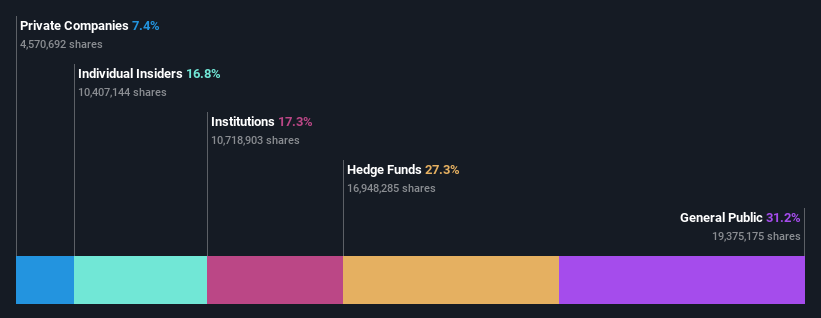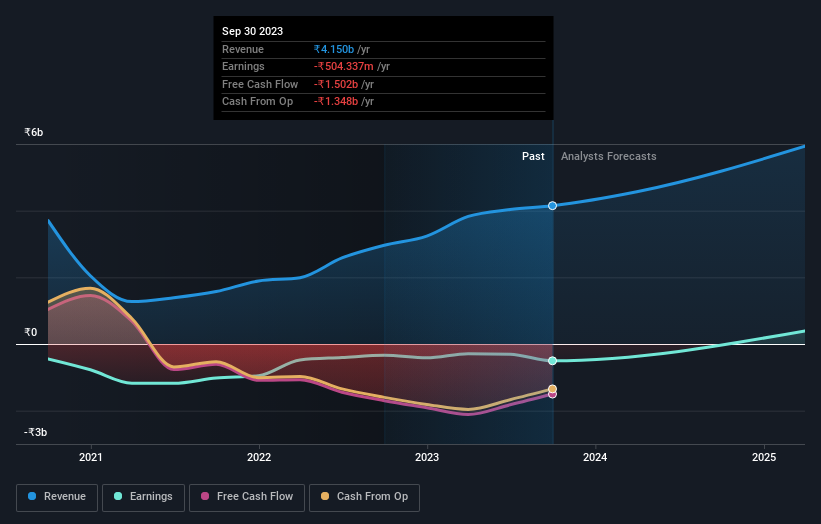Retail investors account for 31% of Yatra Online, Inc.'s (NASDAQ:YTRA) ownership, while hedge funds account for 27%
Key Insights
The considerable ownership by retail investors in Yatra Online indicates that they collectively have a greater say in management and business strategy
A total of 8 investors have a majority stake in the company with 53% ownership
A look at the shareholders of Yatra Online, Inc. (NASDAQ:YTRA) can tell us which group is most powerful. And the group that holds the biggest piece of the pie are retail investors with 31% ownership. In other words, the group stands to gain the most (or lose the most) from their investment into the company.
Hedge funds, on the other hand, account for 27% of the company's stockholders.
In the chart below, we zoom in on the different ownership groups of Yatra Online.
See our latest analysis for Yatra Online
What Does The Institutional Ownership Tell Us About Yatra Online?
Many institutions measure their performance against an index that approximates the local market. So they usually pay more attention to companies that are included in major indices.
Yatra Online already has institutions on the share registry. Indeed, they own a respectable stake in the company. This can indicate that the company has a certain degree of credibility in the investment community. However, it is best to be wary of relying on the supposed validation that comes with institutional investors. They too, get it wrong sometimes. If multiple institutions change their view on a stock at the same time, you could see the share price drop fast. It's therefore worth looking at Yatra Online's earnings history below. Of course, the future is what really matters.
Our data indicates that hedge funds own 27% of Yatra Online. That worth noting, since hedge funds are often quite active investors, who may try to influence management. Many want to see value creation (and a higher share price) in the short term or medium term. MAK Capital One, LLC is currently the company's largest shareholder with 20% of shares outstanding. With 7.7% and 7.3% of the shares outstanding respectively, Altai Capital Management, L.P. and The 2020 Timothy J. Maguire Investment Trust are the second and third largest shareholders. In addition, we found that Dhruv Shringi, the CEO has 3.4% of the shares allocated to their name.
On further inspection, we found that more than half the company's shares are owned by the top 8 shareholders, suggesting that the interests of the larger shareholders are balanced out to an extent by the smaller ones.
While studying institutional ownership for a company can add value to your research, it is also a good practice to research analyst recommendations to get a deeper understand of a stock's expected performance. There is a little analyst coverage of the stock, but not much. So there is room for it to gain more coverage.
Insider Ownership Of Yatra Online
While the precise definition of an insider can be subjective, almost everyone considers board members to be insiders. The company management answer to the board and the latter should represent the interests of shareholders. Notably, sometimes top-level managers are on the board themselves.
I generally consider insider ownership to be a good thing. However, on some occasions it makes it more difficult for other shareholders to hold the board accountable for decisions.
Our most recent data indicates that insiders own a reasonable proportion of Yatra Online, Inc.. Insiders own US$20m worth of shares in the US$117m company. This may suggest that the founders still own a lot of shares. You can click here to see if they have been buying or selling.
General Public Ownership
The general public, who are usually individual investors, hold a 31% stake in Yatra Online. While this size of ownership may not be enough to sway a policy decision in their favour, they can still make a collective impact on company policies.
Private Company Ownership
We can see that Private Companies own 7.4%, of the shares on issue. It might be worth looking deeper into this. If related parties, such as insiders, have an interest in one of these private companies, that should be disclosed in the annual report. Private companies may also have a strategic interest in the company.
Next Steps:
I find it very interesting to look at who exactly owns a company. But to truly gain insight, we need to consider other information, too.
I always like to check for a history of revenue growth. You can too, by accessing this free chart of historic revenue and earnings in this detailed graph.
If you are like me, you may want to think about whether this company will grow or shrink. Luckily, you can check this free report showing analyst forecasts for its future.
NB: Figures in this article are calculated using data from the last twelve months, which refer to the 12-month period ending on the last date of the month the financial statement is dated. This may not be consistent with full year annual report figures.
Have feedback on this article? Concerned about the content? Get in touch with us directly. Alternatively, email editorial-team (at) simplywallst.com.
This article by Simply Wall St is general in nature. We provide commentary based on historical data and analyst forecasts only using an unbiased methodology and our articles are not intended to be financial advice. It does not constitute a recommendation to buy or sell any stock, and does not take account of your objectives, or your financial situation. We aim to bring you long-term focused analysis driven by fundamental data. Note that our analysis may not factor in the latest price-sensitive company announcements or qualitative material. Simply Wall St has no position in any stocks mentioned.


